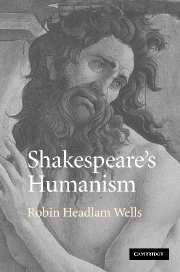9 - Anti-humanism
Published online by Cambridge University Press: 22 September 2009
Summary
Let me begin by summarising the argument I set out in my Introduction. Anti-humanism, or anti-essentialism as it's usually termed, is the core theoretical principle of postmodern Shakespeare criticism. It's true that Cultural Materialism makes a particular point of studying literary texts in their historical context. But so too did pre-theoretical historical scholarship. And contrary to what is uniformly claimed in postmodern Shakespeare criticism, twentieth-century historicists had a thoroughly sophisticated understanding of the problems involved in reconstructing the past (see below, pp. 188–9). It's anti-essentialism, rather than an interest in historical context, that chiefly distinguishes Cultural Materialism from older forms of historical scholarship. It's also, despite the claim that it signalled ‘the return of history in literary criticism’, what principally marks New Historicism off from earlier twentieth-century forms of literary historicism. Jean Howard is right when she says that the key to what's new about New Historicism is ‘the basic issue of what one assumes to be the nature of man’; central to postmodern historicism on both sides of the Atlantic is ‘the attack on the notion that man possesses a transhistorical core of being. Rather, everything from “maternal instinct” to conceptions of the self are now seen to be the products of specific discourses and social processes.’ We know that this is true (as Howard says, it's something we can ‘assume’), not because of what we might deduce from research into the mental capabilities of neonatal infants before they've had a chance to absorb culture, clinical experiments designed to test mind theory, cross-cultural studies of gender differences in a wide variety of urban and rural communities, or the epidemiology of culture (how ideas spread), but because, as Howard explains, we have it on Foucault's authority.
- Type
- Chapter
- Information
- Shakespeare's Humanism , pp. 177 - 203Publisher: Cambridge University PressPrint publication year: 2005
- 1
- Cited by



